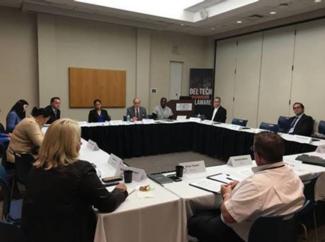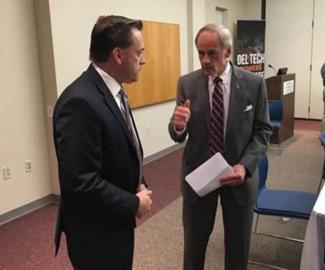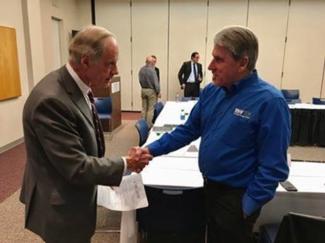- October 30, 2018
Carper Highlights Major Water Infrastructure Bill Wins for Delaware’s Drinking Water in Sussex County
Bipartisan bill co-authored by Carper was signed into law this week




ELLENDALE/BETHANY BEACH, Del. – Today, Senator Tom Carper, (D-Del.), top Democrat on the Environment and Public Works (EPW) Committee, was joined by community leaders in Ellendale and Bethany Beach to discuss major wins for the state of Delaware in America’s Water Infrastructure Act – a bipartisan bill that Senator Carper co-authored to update and enhance our nation’s water infrastructure. The bipartisan legislation passed the Senate by a vote of 99 to 1, passed the House unanimously, and was signed into law earlier this week. First, Senator Carper visited Ellendale with Congresswoman Lisa Blunt Rochester (D-Del.) to discuss the key provisions in the major water infrastructure bill to improve drinking water systems and waste water systems in the state and across the country. Senator Carper then stopped at Bethany Beach to discuss a new $75 million beach nourishment program for the Mid-Atlantic that he fought hard to get in the bill.
In Ellendale, Senator Carper was joined by Congresswoman Blunt Rochester, Bishop Major Foster and Faith Whaley of the Philadelphia Pentecostal Church, Maria Payan of Socially Responsible Agricultural Project, and Collin O’Mara of National Wildlife Federation.
In Bethany Beach, Senator Carper was joined by Mayor of Lewes Ted Becker, Mayor of Bethany Beach Lew Killmer, Sara Booth, President of Bethany-Fenwick Area Chamber of Commerce Board, and Chris Bason, Executive Director of Center for Inland Bay.
This is the first major infrastructure bill to pass this Congress. The legislation advances key programs and makes much-needed legislative changes to support clean drinking water systems, waterways, beaches, and port projects, such as the expansion of the Port of Wilmington. It directs the Army Corps of Engineers and the Environmental Protection Agency (EPA) to make vital improvements to water infrastructure to prepare Delaware – the lowest lying state in the country – for the growing risks of climate change. This bill also prioritizes the needs of stakeholders in Delaware and around the country to make sure our economy grows in a safe and environmentally friendly way. The bill passed the Senate by a vote of 99-1 and was signed into law this week.
“This major water infrastructure bill delivers for Delaware and families across our country. It makes smart investments in critical water infrastructure we don’t see every day, but that Delaware and families in every state rely on, such as drinking water systems, dams, reservoirs, levees, and ports,” said Senator Carper. “And this bill creates an environment for good-paying jobs here at home, incentivizes businesses to buy and use American products, and authorizes funding for EPA to expand investments in clean drinking water for the first time in more than two decades.”
Senator Carper continued, “I fought hard to make sure key priorities for Delaware were included in this bill, and I’m proud we were able to deliver. The drinking water contamination problems we are now seeing in far too many communities across Sussex County are tragic, but avoidable if we invest in water infrastructure more wisely. Now with resources from this bill, we can make sure everyone – no matter what zip code they live in – can be confident that the water coming out of their tap is safe for their families to drink. This bill also expands monitoring for unregulated contaminants, like those found in Blades’ water earlier this year, and provides new resources to help small and rural communities to support contamination cleanup efforts for public and private wells. I’m also proud that this bill includes a new $75 million program to address critical beach nourishment projects along our state’s coasts because as we all know, Delaware’s beaches are a significant part of its $3.3 billion tourism economy. They say an ounce of prevention is worth a pound of cure – nowhere is this truer than in this bill.”
“Clean water is an essential right regardless of the zip code you live in, and for us to fully realize that right, we need to improve our nation’s water infrastructure,” said Congresswoman Blunt Rochester. “With the American’s Water Infrastructure Act, we are taking meaningful steps toward improving our drinking water in New Castle, Kent, and Sussex Counties, creating more jobs at the Port of Wilmington, and replenishing our cherished shoreline. I was proud to support this bill when it came to the House floor, and I applaud Senator Carper for his leadership in crafting this vitally important bill for Delaware.”
“The residents of Sussex County have suffered for too long from contaminated drinking water, so we are grateful that the Delaware Congressional Delegation, led by Senator Carper, secured federal funding that could help to address their problems,” said Michele Merkel, Co-Director of the Food & Water Justice Project at Food & Water Watch. “However, this funding can only be accessed by the states, so we call upon Governor Carney to request the funding so that the citizens in Sussex County can finally have access to clean drinking water.”
“Today is a testament that clean water is not a bipartisan issue and we can still pass legislation in these divided times,” said Maria Payan, a consultant with the Socially Responsible Agricultural Project. “Today is a celebration because it reinforces that our democracy works best when citizens and their elected officials work together for meaningful solutions.”
“Clean, safe drinking water and resilient natural defenses are essential for every Delaware community from Fenwick Island to Wilmington. It’s why Senator Carper worked tirelessly across party lines with Wyoming Senator John Barrasso to pass a strong Water Resources Development Act that will help communities across Delaware,” said Collin O’Mara, president and CEO of the National Wildlife Federation. “Senator Carper is the leading voice in Congress for ensuring every American has access to clean water, including leading a bipartisan and bicameral push to expand investments in drinking water, wastewater, and irrigation systems and reauthorize the Safe Drinking Water Act for the first time in 20 years. His leadership on WRDA will help protect Delaware’s coastal and inland communities alike from extreme storms and flooding through investments natural infrastructure projects — such as restoring wetlands, oyster reefs, and sand dunes. Even during these deeply divided political times, Senator Carper continues to find a way to make progress on basic issues of public health and safety that affect all of us.”
Overall, America’s Water Infrastructure Act:
- Increases the existing height limit authorization for the deposit of dredge material from the Delaware River dredging project from 10 feet to 35 feet, a necessary development to expand the Port of Wilmington at the new Edgemoor location and double its annual output;
- Expands the existing $60 million per year small and disadvantaged community grant program to create a new grant for underground drinking water contamination to help states address communities, like the areas around Millsboro, that face high levels of drinking water contamination;
- Authorizes $75 million in appropriations for a new beach nourishment and shoreline protection pilot program;
- Authorizes the Corps to expedite, construct, modify, or study more than 100 water resource development projects;
- Reforms the Corps’ budgeting process to provide greater transparency for both Congress and the public and mandates that the Corps annually report uncompleted work at all phases of a project’s lifecycle;
- Requires the Army Corps to consider natural infrastructure alternatives when developing new projects;
- Gives state and local leaders a greater role in prioritizing Army Corps projects and allows local sponsors to provide advanced funds for projects so that work can be initiated faster and stay on schedule;
- Boosts flood control efforts by reauthorizing levee safety and dam safety programs through 2023;
- Establishes multiple resiliency programs to help communities invest in protecting their water infrastructure from extreme weather events and sea level rise;
- Re-authorizes, for the first time in 22 years, the Drinking Water State Revolving Loan Fund that provides for needed investments in communities across the country, doubling the size of the program from $1 billion to $1.95 billion by 2021;
- Authorizes a new $100 million drinking water program to help areas impacted by natural disasters repair damaged drinking water infrastructure and make such infrastructure more resilient to future storms;
- Extends for five years the Buy America requirements of the drinking water state revolving loan fund to ensure American made products are used to construct projects funded through the program; and
- Expands the lead in schools testing program to provide schools with additional assistance to address lead contamination, including the replacement of drinking water fountains.
Read the text of America’s Water Infrastructure Act here.
ELLENDALE/BETHANY BEACH, Del. – Today, Senator Tom Carper, (D-Del.), top Democrat on the Environment and Public Works (EPW) Committee, was joined by community leaders in Ellendale and Bethany Beach to discuss major wins for the state of Delaware in America’s Water Infrastructure Act – a bipartisan bill that Senator Carper co-authored to update and enhance our nation’s water infrastructure. The bipartisan legislation passed the Senate by a vote of 99 to 1, passed the House unanimously, and was signed into law earlier this week. First, Senator Carper visited Ellendale with Congresswoman Lisa Blunt Rochester (D-Del.) to discuss the key provisions in the major water infrastructure bill to improve drinking water systems and waste water systems in the state and across the country. Senator Carper then stopped at Bethany Beach to discuss a new $75 million beach nourishment program for the Mid-Atlantic that he fought hard to get in the bill.
In Ellendale, Senator Carper was joined by Congresswoman Blunt Rochester, Bishop Major Foster and Faith Whaley of the Philadelphia Pentecostal Church, Maria Payan of Socially Responsible Agricultural Project, and Collin O’Mara of National Wildlife Federation.
In Bethany Beach, Senator Carper was joined by Mayor of Lewes Ted Becker, Mayor of Bethany Beach Lew Killmer, Sara Booth, President of Bethany-Fenwick Area Chamber of Commerce Board, and Chris Bason, Executive Director of Center for Inland Bay.
This is the first major infrastructure bill to pass this Congress. The legislation advances key programs and makes much-needed legislative changes to support clean drinking water systems, waterways, beaches, and port projects, such as the expansion of the Port of Wilmington. It directs the Army Corps of Engineers and the Environmental Protection Agency (EPA) to make vital improvements to water infrastructure to prepare Delaware – the lowest lying state in the country – for the growing risks of climate change. This bill also prioritizes the needs of stakeholders in Delaware and around the country to make sure our economy grows in a safe and environmentally friendly way. The bill passed the Senate by a vote of 99-1 and was signed into law this week.
“This major water infrastructure bill delivers for Delaware and families across our country. It makes smart investments in critical water infrastructure we don’t see every day, but that Delaware and families in every state rely on, such as drinking water systems, dams, reservoirs, levees, and ports,” said Senator Carper. “And this bill creates an environment for good-paying jobs here at home, incentivizes businesses to buy and use American products, and authorizes funding for EPA to expand investments in clean drinking water for the first time in more than two decades.”
Senator Carper continued, “I fought hard to make sure key priorities for Delaware were included in this bill, and I’m proud we were able to deliver. The drinking water contamination problems we are now seeing in far too many communities across Sussex County are tragic, but avoidable if we invest in water infrastructure more wisely. Now with resources from this bill, we can make sure everyone – no matter what zip code they live in – can be confident that the water coming out of their tap is safe for their families to drink. This bill also expands monitoring for unregulated contaminants, like those found in Blades’ water earlier this year, and provides new resources to help small and rural communities to support contamination cleanup efforts for public and private wells. I’m also proud that this bill includes a new $75 million program to address critical beach nourishment projects along our state’s coasts because as we all know, Delaware’s beaches are a significant part of its $3.3 billion tourism economy. They say an ounce of prevention is worth a pound of cure – nowhere is this truer than in this bill.”
“Clean water is an essential right regardless of the zip code you live in, and for us to fully realize that right, we need to improve our nation’s water infrastructure,” said Congresswoman Blunt Rochester. “With the American’s Water Infrastructure Act, we are taking meaningful steps toward improving our drinking water in New Castle, Kent, and Sussex Counties, creating more jobs at the Port of Wilmington, and replenishing our cherished shoreline. I was proud to support this bill when it came to the House floor, and I applaud Senator Carper for his leadership in crafting this vitally important bill for Delaware.”
“The residents of Sussex County have suffered for too long from contaminated drinking water, so we are grateful that the Delaware Congressional Delegation, led by Senator Carper, secured federal funding that could help to address their problems,” said Michele Merkel, Co-Director of the Food & Water Justice Project at Food & Water Watch. “However, this funding can only be accessed by the states, so we call upon Governor Carney to request the funding so that the citizens in Sussex County can finally have access to clean drinking water.”
“Today is a testament that clean water is not a bipartisan issue and we can still pass legislation in these divided times,” said Maria Payan, a consultant with the Socially Responsible Agricultural Project. “Today is a celebration because it reinforces that our democracy works best when citizens and their elected officials work together for meaningful solutions.”
“Clean, safe drinking water and resilient natural defenses are essential for every Delaware community from Fenwick Island to Wilmington. It’s why Senator Carper worked tirelessly across party lines with Wyoming Senator John Barrasso to pass a strong Water Resources Development Act that will help communities across Delaware,” said Collin O’Mara, president and CEO of the National Wildlife Federation. “Senator Carper is the leading voice in Congress for ensuring every American has access to clean water, including leading a bipartisan and bicameral push to expand investments in drinking water, wastewater, and irrigation systems and reauthorize the Safe Drinking Water Act for the first time in 20 years. His leadership on WRDA will help protect Delaware’s coastal and inland communities alike from extreme storms and flooding through investments natural infrastructure projects — such as restoring wetlands, oyster reefs, and sand dunes. Even during these deeply divided political times, Senator Carper continues to find a way to make progress on basic issues of public health and safety that affect all of us.”
Overall, America’s Water Infrastructure Act:
- Increases the existing height limit authorization for the deposit of dredge material from the Delaware River dredging project from 10 feet to 35 feet, a necessary development to expand the Port of Wilmington at the new Edgemoor location and double its annual output;
- Expands the existing $60 million per year small and disadvantaged community grant program to create a new grant for underground drinking water contamination to help states address communities, like the areas around Millsboro, that face high levels of drinking water contamination;
- Authorizes $75 million in appropriations for a new beach nourishment and shoreline protection pilot program;
- Authorizes the Corps to expedite, construct, modify, or study more than 100 water resource development projects;
- Reforms the Corps’ budgeting process to provide greater transparency for both Congress and the public and mandates that the Corps annually report uncompleted work at all phases of a project’s lifecycle;
- Requires the Army Corps to consider natural infrastructure alternatives when developing new projects;
- Gives state and local leaders a greater role in prioritizing Army Corps projects and allows local sponsors to provide advanced funds for projects so that work can be initiated faster and stay on schedule;
- Boosts flood control efforts by reauthorizing levee safety and dam safety programs through 2023;
- Establishes multiple resiliency programs to help communities invest in protecting their water infrastructure from extreme weather events and sea level rise;
- Re-authorizes, for the first time in 22 years, the Drinking Water State Revolving Loan Fund that provides for needed investments in communities across the country, doubling the size of the program from $1 billion to $1.95 billion by 2021;
- Authorizes a new $100 million drinking water program to help areas impacted by natural disasters repair damaged drinking water infrastructure and make such infrastructure more resilient to future storms;
- Extends for five years the Buy America requirements of the drinking water state revolving loan fund to ensure American made products are used to construct projects funded through the program; and
- Expands the lead in schools testing program to provide schools with additional assistance to address lead contamination, including the replacement of drinking water fountains.
Read the text of America’s Water Infrastructure Act here.